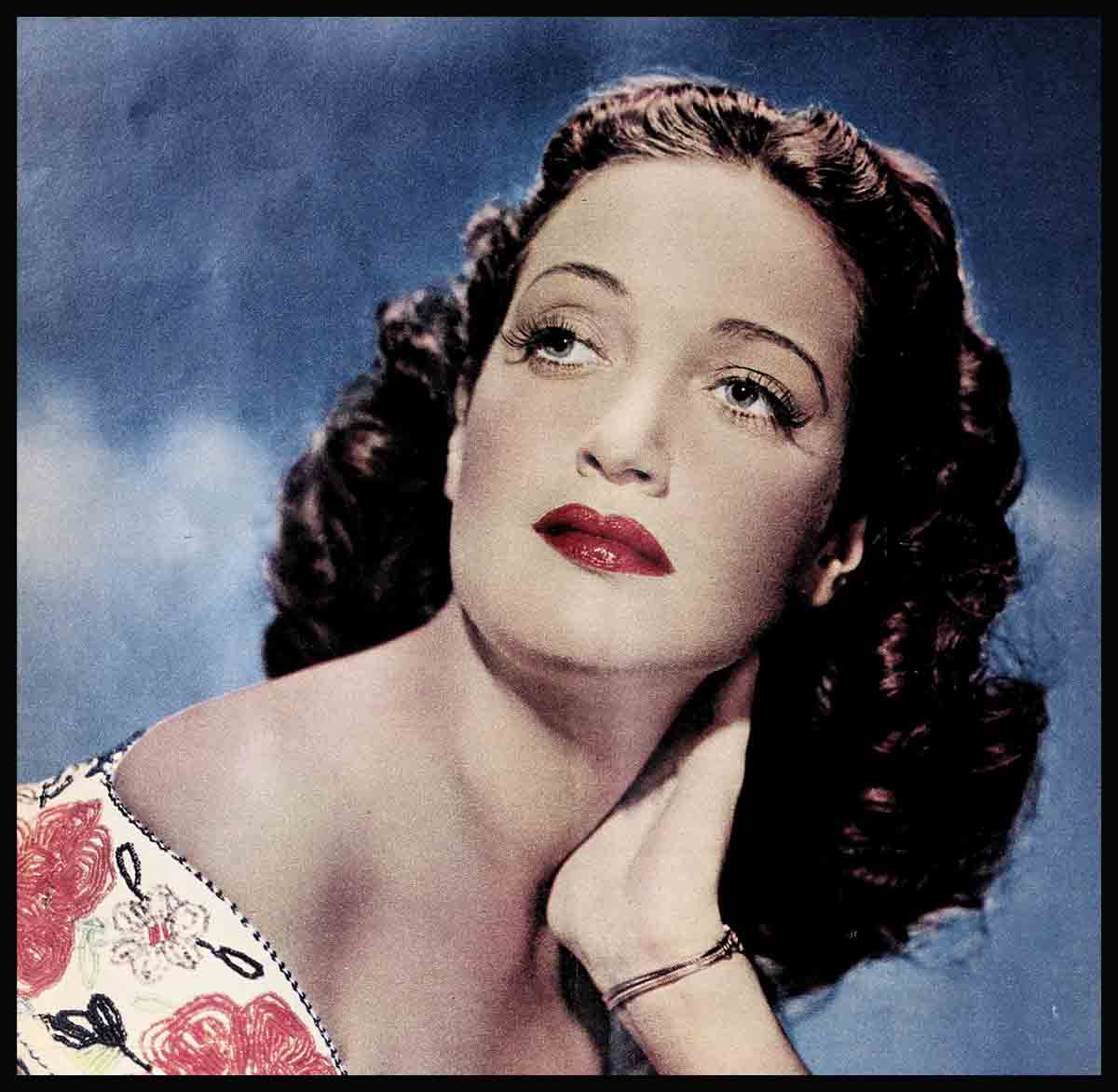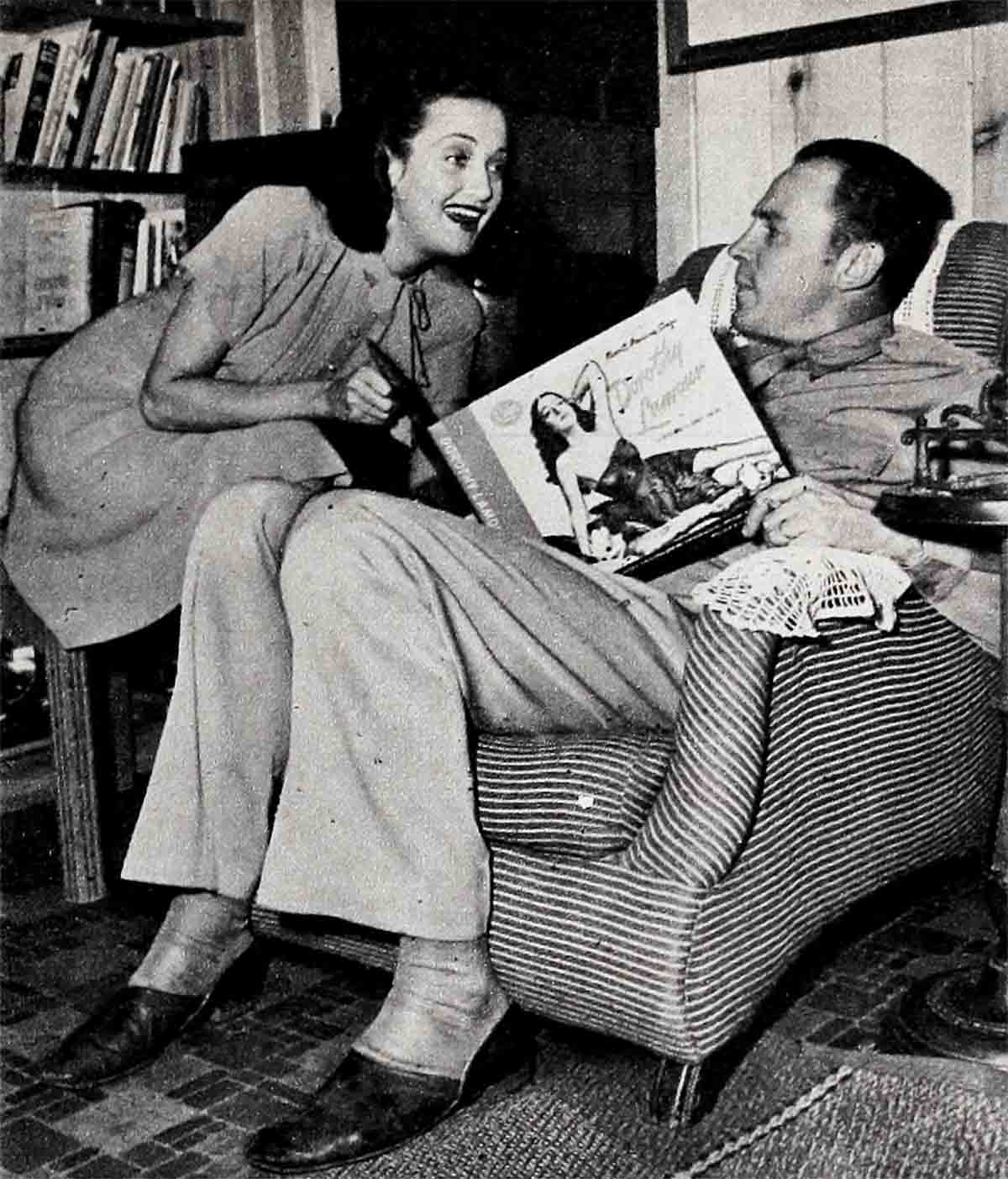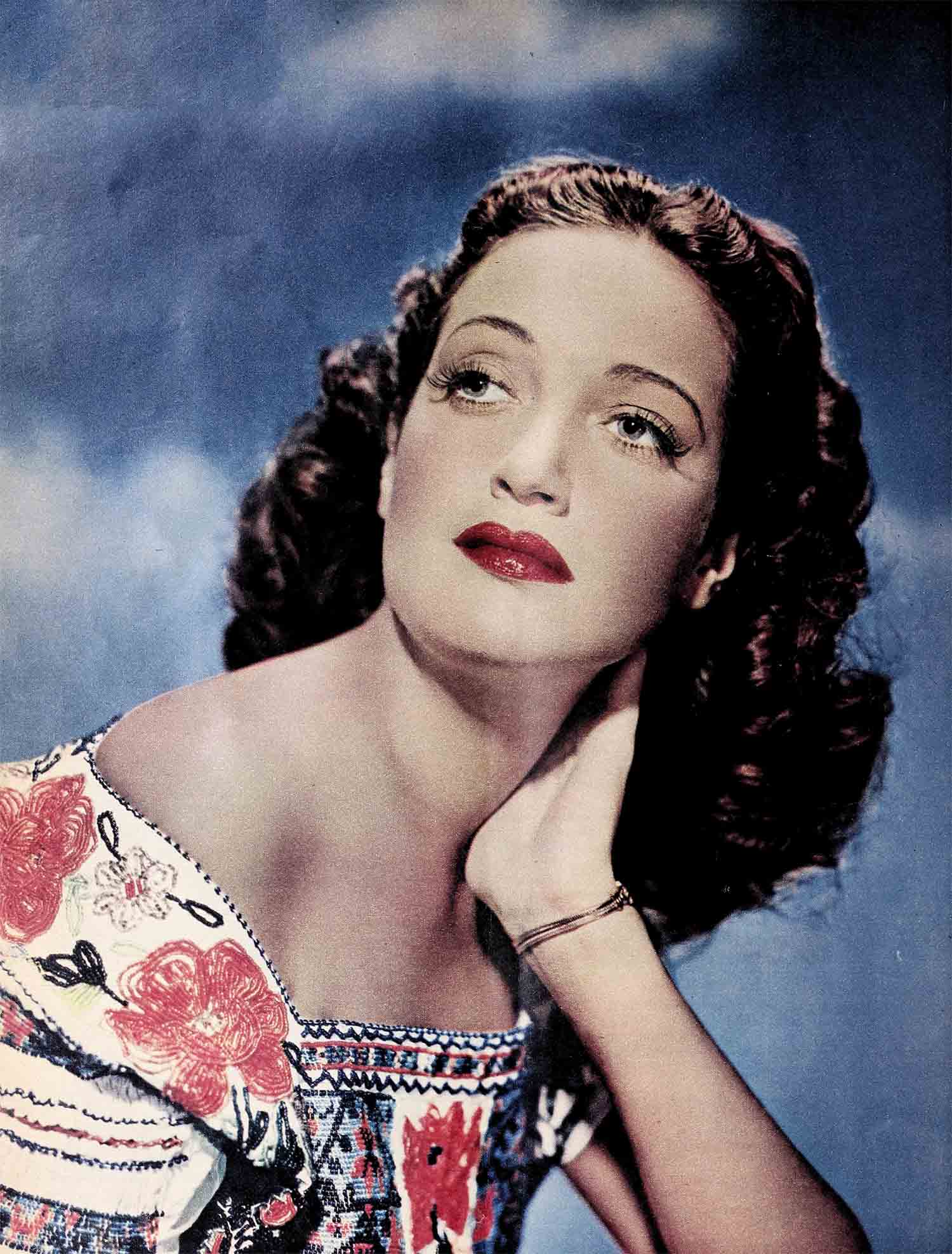
Life With The Major’s Lady—Dorothy Lamour & William Howard
To Paramount Pictures, the home of Dorothy Lamour and a host of Hollywood’s great, we tender our thanks for a third of a century of progressively fine entertainment. Eloquent proof is “Going My Way,” which received Photoplay’s Gold Medal Award for the best picture of 1944 as the result of the annual nation-wide poll of movie-goers conducted by Dr. George Gallup, Director of Audience Research, Inc., for Photoplay.
The Editors
We were stretched out in the hot sunshine in the small garden behind a little white house in San Bernardino, California, when Dorothy Lamour decided she might just as well, after two wonderful years, reveal the truth about her love and marriage.
If you want to know the brutal truth, Dottie picked up Bill Howard, who’s now her husband. And you know what happens to girls who pick up men, don’t you? Well, that is what did not happen to Dottie.
Love intervened, as you will see, and it is as sentimental a yarn as ever was set down on paper. It’s got everything in it, rich hotels, swimming pools, champagne parties, handsome uniformed men, Hollywood glitter, love letters, all centering about a wealthy playboy and a movie star who thought the only place they’d ever be happy was in a night club.
In the background of the story there are today many packets, tied with many colored ribbons, silly little notes, old corsages, theater programs, movie stubs, snapshots, telegrams and bills for wedding rings, all carefully saved.
The story begins one October evening in 1941 when the luscious Lamour, together with her closest friend, Laura LaMarr, went up to the swank Arrowhead Springs Hotel for a little rest between pictures, which meant being pretty close to a jazz band, within smiling distance of a mob of good-looking men and within reaching distance of good, rich food.
On this particular occasion, however, Dottie and Laura had assured one another that they were not going to dance, they were not going to have so much as one cocktail, they were not going to say even boo to any man. All they were going to do was rest, exercise, get to bed early and diet, diet, diet.
Perhaps they would have been as dull as that if they hadn’t run into Charlie Boettcher right at the desk, as they went up to register.
“Dottie Lamour,” cried Mr. Boettcher. “Of all the lucky breaks. What are you doing tonight?”
“I’m not doing a thing,” Dottie said. “I’ve come up for a rest.”
“Dine with me,” begged Charlie. “After all, I’ve waited ten years to have a date with you. Just have dinner. You can be all through by nine, honest.”

Dottie is the softest-hearted individual in nine states. She simply couldn’t be cruel enough to turn down a man who’d waited ten years to date her. So presently, there she and Laura were, with Charlie and about six other men in uniform who swarmed around Charlie when he appeared with two such beautiful dolls. Dinner was proceeding nicely when a particularly handsome lieutenant bore down on the group.
“Charlie, my old, old pal,” he said.
“Hello,” said Charlie.
“Pal, what are you doing here? How long are you staying? How about having a drink with me?”
“No, thanks,” said Charlie.
“Listen, friend, I want to talk to you, I want to see you.”
“I’ll see you,” said Charlie and firmly turned his back. There wasn’t much for the Lieutenant to do but move on.
Sitting next to Charlie, Dottie Lamour sputtered with anger. “You were very rude to that poor lonely soldier.”
“Sure I was,” said Charlie. “That guy has moved in on my dates before. I’ve been waiting ten years for this date with you. I’m not going to have him taking it away from me.”
Nine o’clock passed and so did ten, and the band was wonderful and Dottie and Laura forgot all about their resolutions to be early birds. But all the time there sat that handsome Lieutenant, all alone, just watching Dottie with such adoring humility. Finally she could stand it no longer. She beckoned to him. Like a flash he was beside her. “Let’s dance,” he said, and that’s how Dottie picked up William Ross Howard III, now Major Howard.
Dottie says so, even though she’s never told it before.
Well, for the next several days, it was quite a battle in tactics. Charlie and Bill, who are really friends, called themselves the Air Corps Commandos and, very frankly, Dottie was their beautiful beachhead. Where Bill appeared, there was Charlie, and where Charlie appeared, there was Bill. But it was Bill who made the best time.
When Dorothy and Laura returned to Hollywood, Bill’s letters and flowers and telephone calls followed her. It was terrific fun but Dorothy didn’t take it seriously. This was because, in checking up on William Ross Howard, III, she discovered that while he came of a distinguished old American family, the Howards of Maryland, and before he had gone into service, he had worked at a lumber business he had inherited, he still had not worked in any manner that would interfere with his going to Palm Beach or Palm Springs in winter, or California or Europe in the summer, or to Placid for the winter sports. He had been married and divorced and had a son. Never at any time had he threatened to do that stuffy thing called settling down.
This was all right with Dottie. She, too, had been married and divorced, from Herbie Kay, the bandleader. Being a working girl, she couldn’t play too much, but she didn’t want to be serious, either.
It was all very gay—the courtship of the playboy and the movie star and it might have gone on that way if Jap planes hadn’t blasted Pearl Harbor that fateful Sunday in December, 1941. Bill’s duties took on a new and sober significance. Dottie kept right on working—and going on the Bond tours which she herself initiated.
They had planned to spend New Year’s Eve at the same party, but Bill called on Dottie and told her not to expect him—he might be shipped overseas. Sure enough. His orders came. The first lap was San Francisco. There he contracted pneumonia and was laid up for four months. During his illness his mother traveled across the continent from Maryland to San Francisco to see him. She saw Dottie too and added her approval to a match which was bound to be. When Bill recovered he was sent to San Bernardino. Of course, he managed to get in to Hollywood now and then—even to the set where Dottie was then making a “Road” picture with Bing Crosby and Bob Hope. It didn’t take him long to see how his gal rated with these two!
By now they knew they belonged together—that no day was right when they were apart. So the former playboy asked Dottie to set a date. She named April 7, 1943. Promptly he asked her what kind of a ring she wanted.
“I want a plain, old-fashioned gold ring, as old-fashioned as the kind of marriage I hope we have,” she said.
“Then I want that kind of a ring too,” Bill answered.
“You buy mine. I’ll buy yours,” Dottie said. Now she laughs when she tells it. “I got the worst of the bargain. My ring only cost $13.50, but Bill’s cost $15.00.” She has both bills, both marked paid.
They had a small wedding in Hollywood and a small reception later for their close friends. It was very romantic and everything still looked gay and exciting—considering it was war time—and they thought they could continue their life together in just that mood, if Bill wasn’t shipped out, the only difference being that now they belonged together.

They might have done that, too, except for three things. There was the gas shortage. There was the house shortage. There was the servant shortage. Bill was still stationed in San Bernardino. Dotty had to be in Hollywood. Better than seventy miles lie in between. Bill didn’t have gas enough to make the trip often. Neither did Dottie. They had married to be together. Dottie finally said, “You have to be in San Bernardino all the time. I only have to be at the studio for six weeks at a time. We’ll live in San Bernardino, and when I’m working I’ll live near the studio and come home here weekends.”
They rented a sweet little house, and you could find the duplicate of it twenty thousand times in this wonderful country of ours. It has a small unfenced lawn, with a few weeds in front of it, and a small garden with a few bright flowers and a thriving Victory vegetable garden in back of it. It has a living room all across the center of it, probably fourteen by twenty feet, and two wings on either side. One wing contains the two small bedrooms and one bath, the other wing the small den, the smaller dining room, the smallest kitchen. “We’ve never sat in that living room yet,” Dottie says. “We just walk through it and use the den.”
The playboy and the movie star, as Captain and Mrs. Howard, began hunting for a cook and a maid. They couldn’t find them, so they next hunted for a girl who would do both jobs. They couldn’t find her. They hunted for a mere cleaning woman to help out. She didn’t exist either.
Dottie grins as she tells it. “Because I’ve always had to work at things that paid money, I’d never done anything around a home. Naturally Bill never had, but here we were, the glamorous newlyweds, in dust up to our knees. So, finally, we went down on them. First of all we started bossing one another, telling each other how to sweep or scrub or whatever it was. That caused arguments, but could I stay mad at Bill? I couldn’t, for whenever I got childish and hurt, he’d just sit in a corner and say, “Look at that poor lonely soldier,” and then I’d laugh, or if he did get difficult about drying dishes, or something, I’d say, “Look at that poor lonely soldier,” and he’d laugh. We evolved a method of housework that we still follow. I start on one wing. Bill on the other. Whoever gets his chores done first drops in the den and the laggard has to mix the drinks for both. At first they were always cocktails, but gradually they became cokes, or tomato juice, or some such harmless thing.
“We did the same thing about cooking. Neither of us knew much to begin with, but now we’ve learned the darndest things. I do beautiful salads and home-made soups, which Bill loves, and he does the best spaghetti I ever ate anywhere.
“On our first anniversary, nothing would do but we had to go into town and dress all up something wild and go dancing at Mocambo. We had a big party and a thousand laughs and it was all gorgeous. But this April 7th, our second anniversary, if we didn’t talk it over and honestly prefer just to be alone, here by ourselves, listening to the radio, drinking one little toast to ourselves!”
Dottie’s voice suddenly dropped. “It’s so strange,” she said. “Today Bill’s a major. We still don’t know when or if he’ll go overseas. I know I’m very lucky to have had him with me this long, and we are prepared for whatever may come. That is one of the things we talked over before our marriage. If we must be parted, it won’t be a weepy goodbye scene for us. I’ll just have to take it, and I hope I can take it as bravely as the other millions of war wives. But these days that we do have together—well, they are definitely not exciting. They are something so much better.
“I used to be in a panic when people told me that that first exciting love went, to be replaced by another type of love. I was such a dope I couldn’t believe any love could be better. But it is. The love Bill and I have now—oh, it’s so secure,, so deep, so quiet. It’s just there. Do you know what Bill said the other night? Here we were, sitting side by side, just listening to the radio, when suddenly I realized we hadn’t been out anywhere or seen anyone besides ourselves for nearly two weeks. There I was, telling Bill how I’d been to market and couldn’t get meat and that we didn’t have points enough for butter—such absolutely thrilling conversation—and I stopped and said, ‘Bill, does this bore you?’ Bill, the angel, said, ‘Dottie, the more years I’m with you, the less there seems to be moments enough in even the longest day to make up for the time I want to be with you.”
She stopped and her eyes began to shine. “And now this news,” she said. “It tops everything.”
Perhaps you’ve read that news. She and Bill are going to be parents in December.
“Bill’s had a son,” she said, “so I rather hope we’ll have a daughter, but actually it doesn’t matter what we get, so long as we get our baby. The doctor is being pretty severe with me. I have to lie around all day. He won’t let me do anything—I can’t smoke, or drink, or dance, or even walk, but it doesn’t matter, either, so long as we get the happy ending. The only thing is my poor child is not going to have any December birthday. I’ve had that all my life and I know how hard it is on a kid. Mine comes just two weeks before Christmas, which means you get cheated out of one set of gifts. So, while we expect the baby just about Christmas, I assure you its birthday is going to be June or July officially.” She stopped and smiled again. “All I do now is lie around and fix up our scrapbook.”
“Our Lives Together—starring Dottie and Bill” is printed in big gold letters on the beautiful white leather covers of the scrapbook. Beneath the title is the date of the Howard wedding. “See the space below,” Dottie pointed out. “That’s for ‘featuring’—you know—featuring Dottie Howard, born December 26, 1945, and I hope. Master This Howard and Miss That Howard, on and on, for at least four more and better—six.”
There is one thing to be said for being a celebrity in love; The papers keep the whole record for you, as for instance, the front page of the Los Angeles papers, saying “Madame Chiang Kai-shek arrives,” but over that, in bigger type, “Dorothy Lamour Weds William Ross Howard.” Dottie has them all, the first rumors of her engagement, the actual announcement of it, the headlines and photographs of her and Bill when they went to get the license, and all the cards from the marriage chapels and health companies, too, and a piece of her wedding cake, and everything, smack up to the Paramount newsreel of that week, reduced to 16 mm. so she and Bill can run over the shots of their wedding on their movie machine.
Dottie said, lying there in the sunshine, “It’s a funny thing, but the more you fall in love, the less selfish you get. Take me. I used to be so squeamish about the sight of blood, or anything. Now I’ve volunteered for a hospital tour in those hospitals where usually visitors are not allowed, those hidden hospitals where the worst, most hopeless cases are. Those boys get no entertainment, so I asked to go to them.
“Already I’ve been to a few. At first I nearly collapsed. But I’m going back. I’d be there, right now, but the doctor won’t let me go until after the baby comes. Then I shall go again because, hard as it is on any performer, the bravery of those boys is so great as to be unbelievable. I remember one blind boy, who kept saying to me, ‘Dottie, let me feel your face, because I’ve got something in my eyes today, I’m not seeing clearly.’ I couldn’t let him touch my face, for I couldn’t let him feel the tears. I just kept on singing a song for that kid. Those are the boys I want to go back to—boys like that and the ones even worse off.”
The phone rang. It was Bill. He said he just wanted to be sure she felt all right and should he bring home something for dinner.
“No, we’ve got lots of soup left,” Dottie said. She hung up and sighed happily. “Just imagine if I’d been too much of a lady to have picked Bill up.” She laughed I and threw a kiss in the direction of the i Arrowhead Springs Hotel, which could be seen clearly, halfway up the mountains.
“Blessings on you. Arrowhead,” she said.
THE END
It is a quote. PHOTOPLAY MAGAZINE SEPTEMBER 1945




